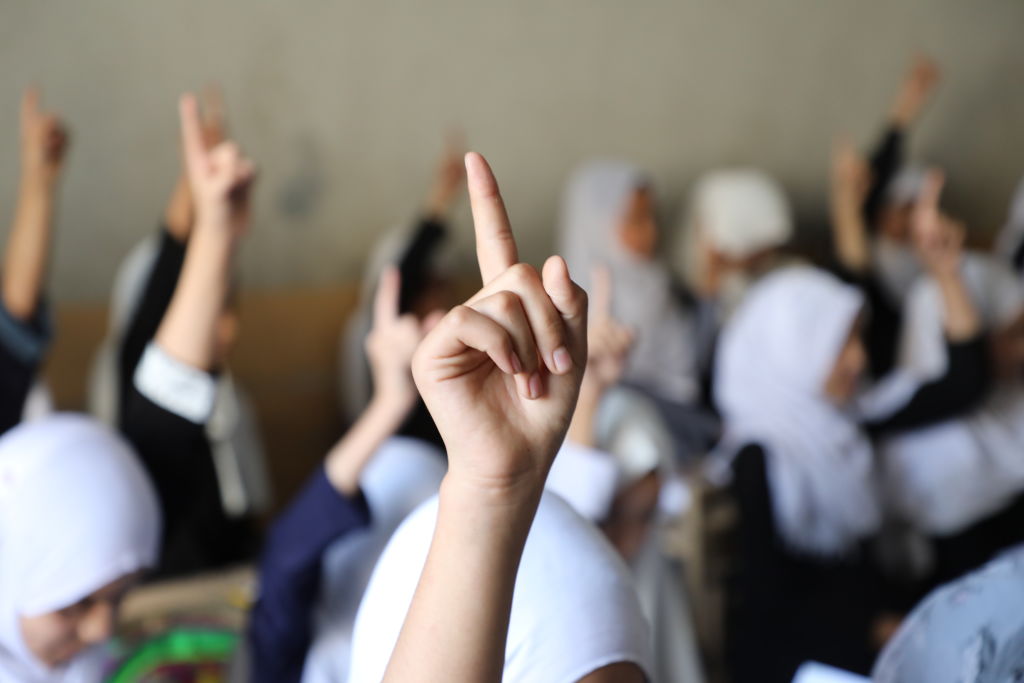Editor’s note: This story was produced in partnership with Rukhshana Media and is part of The Fuller Project’s ongoing series, “Ending America’s Forever War: What is next for Afghan women?”, documenting what the end of America’s longest war on foreign soil means for the women who have lived through it. Follow The Fuller Project’s continuing coverage here.
I am a 16-year-old high school student in one of the northern provinces of Afghanistan. When our city fell to the Taliban, I did not leave my house for two months. The schools were shut on us. Fortunately, it has been three weeks since our school reopened, and I was one of the first students to return to class.
But I no longer have the same hope for my life and the future as I did in the past.
These days, wearing a school uniform no longer cheers me up. Walking my way to school is no longer pleasant, it’s a path full of fear and horror.
The first day that I left home, when I took my first steps towards school, I had a strange feeling. Because of fear, I changed my clothing style. Every time I heard the sound of a car or motorcycle, I imagined the Taliban, and felt that they would shoot at me. With enormous fear and anxiety, I finally made it to school.
Inside the classroom, in the eyes of my classmates, I saw the same fear that I had come to school with. The number of students and teachers who had come to school were few. I had never seen our school so overwhelmed with fear and silence.
When I asked my classmates about the absent ones, I heard that some of them had moved from the city, others had migrated, and some others had gotten married during that time—rather, I should say, they were forced to get married. I also heard that some of my classmates were still in the city, but their families no longer allowed them to attend school.
It pains me to believe that some of my classmates will never see the school again. We were hoping to shape the future, but they took that future away from us.
Related coverage: A school teacher in central Afghanistan laments the loss of educational opportunities for girls and women since the Taliban took control.
One of our teachers, who teaches religious subjects, asked our opinion on Islamic Emirates’ treatment of women. A classmate replied, “The Taliban do not understand anything about the human rights of women at all. If they did, our situation would not be like this.”
“The Taliban understand. It is the world that does not understand. Women’s respect is met in staying at home,” our teacher responded in a threatening tone.
I wanted to criticize our teacher’s opinion, but he angrily motioned for me to not move from my seat. He then began to tell the story of his friendship with Mullah Omar, the first Taliban leader. When the teacher left our classroom, my classmates were terrified. We decided not to say anything because he was obviously a member of the Taliban.
I couldn’t believe that these were the same classmates who, until two months ago, would not even allow any teacher to interrupt them. My classmates are no longer the same. They are worried, anxious, scared and look pale. They have no hope for the future.
“Coming to this school can also be temporary,” one said.
“Even if the Taliban allow us to study, they will only allow us to become teachers and doctors, they won’t allow us to become presidents, ministers, lawyers, businesswomen, and socio-political activists,” said another.
All the conversations on our first day of returning to school revolved around despair and how the future seemed dark and vague. It is not clear what will happen to us.
Just a few days ago, a Taliban delegation came to our school. All the students were terrified and ran to their classrooms. The delegation went to meet with the school administration, and we thought they might have come to close our school. They did not shut our school, but the next day, the number of students was reduced to half. I learned that many students decided to leave school for the fear of the Taliban.
We are going through hard times, days full of despair, fear, tears and horror. The fact that I cannot include the name of my school, my city and my province in this article today is a sign of the fear and terror dominating our daily lives. I am afraid that if I mention the name of my school and city, my school will not be open tomorrow.
But I haven’t kept silent. I wrote this so that the world will know what’s happening to us girls in Afghanistan.
Razia Mohseni, 16, is a high school student. Translation by Sahar Fetrat.


 Razia Mohseni
Razia Mohseni
